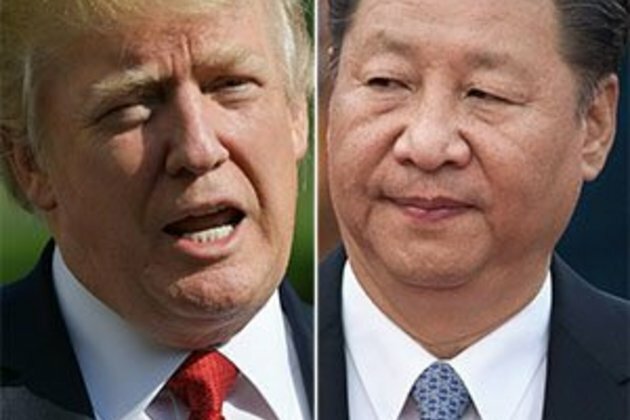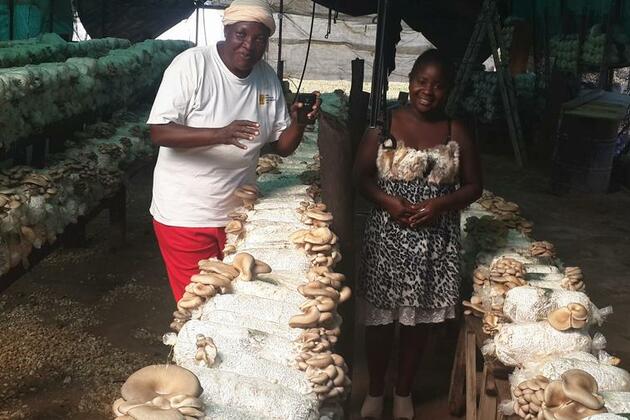Victory awaits in China trade war, Trump tells farmers
News24
15 May 2019, 13:13 GMT+10

Washington - US farmers who are major exporters of pork and soy, are caught in the middle of President Donald Trump's trade wars.
And farmers along with the industries that support them, are also key voters. So with 18 months to go before the presidential election, Trump is hoping to put them at ease and keep their support.
But as trade barriers continue to bite deeper into an industry that was already suffering low prices and falling income, there are signs of mounting frustration.
"Our great Patriot Farmers will be one of the biggest beneficiaries of what is happening now," Trump said Tuesday.
He said he hoped China would "do us the honour" of continuing to buy US farm exports but even if they do not, the government "will be making up the difference" by buying crops to prop up prices.
The tweets came a day after China announced it was raising tariffs on $60bn in US agricultural and manufactured goods to retaliate for Trump's decision last week to raise tariffs on $200bn in Chinese merchandise.
Rural areas are generally more conservative and favorable to Trump, but they have been shaken by the conflict that has brought soy bean exports to China in particular to a screeching halt.
Last year's exports fell by 75% from 2017, according to Commerce Department figures.
And over the last year, they have been targeted not only by China but also the European Union, Canada and Mexico.
For now, while many continue to support Trump, others "are not so sure," according to Will Rodger, head of communications for the American Farm Bureau Federation.
"We don't have hard numbers that tell us exactly how strong support or opposition may be but our gut feeling is most farmers still support the president since they like many of his policies across the board," he told AFP in an email.
US readies new tariffs as Trump says he'll meet China's Xi
Sid Ready, a farmer in Scribner, Nebraska, says the trade war has hurt but farmers were hanging in there.
"We understand it and I think farmers are pretty darn resilient," he said. "In the long run, we hope it works."
Their patience has limits, Rodger said, as revenues have been falling for six years due to global oversupply.
From a record $123.4bn in 2013, farm incomes had fallen by about half as of last year to $63.1bn, according to the US Department of Agriculture.
Many farmers in the Midwestern US breadbasket also have been devastated by floods that destroyed crops and prevented planting.
The American Soybean Association says it generally supports the Trump administration's trade objectives, just not the means used to reach them.
'We always win'
Soy farmers are "frustrated" that Chinese and US negotiators have been unable to strike a bargain and worry their entire business is in danger.
"With depressed prices and unsold stocks expected to double by the 2019 harvest, soybean farmers are not willing to be collateral damage in an endless tariff war," ASA President Davie Stephens said in a statement Monday.
Many fear their Chinese customers, who once bought about a third of the US soy crop, may soon buy even more from Brazil instead.
The Chinese export market for soy took more than 40 years to develop, and as the trade conflict persists "it will become increasingly difficult to recover."
Other buyers, like the European Union, may step in to fill the gap left by China. Still, about two thirds of global soy exports are destined for China.
WATCH: Trump threatens more action in China trade fight
In his Tuesday tweets, Trump said the "massive tariffs" currently in place will pay for government bailouts for suffering farms.
Last week, he suggested the government could purchase the crops and send it as food aid to poor nations.
In July 2018, the government unveiled a $12 billion bailout fund and US farmers already receive about $20bn in annual assistance through various aid programs.
And the National Pork Producer's Council said last week it "welcomes the offer of assistance from President Trump."
"We stand ready to work with the USDA to facilitate US pork exports as food aid to a number of nations," NPCC President David Herring said in a statement.
Exports now account for 26% of all US pork production, of which a large share is normally shipped to China.
Trump on Tuesday called the US-China trade war a "little squabble" and predicted ultimate victory.
"We always win. We always win," he said.
 Share
Share
 Tweet
Tweet
 Share
Share
 Flip
Flip
 Email
Email
Watch latest videos
Subscribe and Follow
Get a daily dose of Madagascar Sun news through our daily email, its complimentary and keeps you fully up to date with world and business news as well.
News RELEASES
Publish news of your business, community or sports group, personnel appointments, major event and more by submitting a news release to Madagascar Sun.
More InformationAfrica
SectionMystery illness in DR Congo could be malaria - media
The outbreak has killed at least 50 people, Reuters has reported A disease outbreak...
Champions Trophy 2025: Afghanistan win toss; opt to bat first against Australia
Lahore [Pakistan], February 28 (ANI): Afghanistan skipper Hashmatullah Shahidi won the toss and elected to bat first against Australia...
"It's my last ICC tournament": Rassie van der Dussen ahead of clash against England in Champions Trophy
Karachi [Pakistan], February 28 (ANI): Ahead of their all-import clash against England at Karachi, South Africa's right-hand batter...
11 killed, 65 injured in explosions after rally in eastern DR Congo
Corneille Nangaa, the political leader of the Congo River Alliance, a politico-military group allied with M23, speaks during a rally...
(Hello Africa) Mushroom farming creates income opportunities for Zambians
Undated file photo shows a small-scale farmer (L) at her mushroom growing tent in Lusaka, Zambia. (Xinhua/Peng Lijun) In recent years,...
Deadly explosions hit rebel rally in eastern DR Congo (VIDEO)
A coalition of militant groups claims the African state's president is responsible for the massacre ...
International
SectionPoland to continue covering Ukraine’s Starlink costs, says deputy PM
WARSAW, Poland: Deputy Prime Minister Krzysztof Gawkowski confirmed over the weekend that Poland has been covering the cost of Ukraine's...
Opinion - Israel's government exploited hostages
Israel sustained the West's support for its slaughter in Gaza for 15 months only through an intensive campaign of lies. It invented...
Pentagon to cut 5,400 jobs amid Trump’s federal workforce reduction
WASHINGTON, D.C.: The Pentagon announced this week that it will cut 5,400 jobs as part of President Donald Trump's plan to shrink the...
Newsom urges Congress for $40 Billion to aid LA wildfire recovery
SACRAMENTO, California: California Governor Gavin Newsom is urging Congress to approve nearly US$40 billion in federal assistance to...
USDA scholarship for underserved students from Black colleges on hold
WASHINGTON, D.C.: A U.S. government scholarship program designed to help students from underserved and rural areas attend historically...
US oil tariff may force foreign producers to pay $10 billion annually
WASHINGTON, D.C.: A proposed 10 percent U.S. tariff on oil imports could deal a US$10 billion annual blow to foreign producers, particularly...













